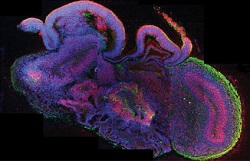 |
| A cross-section of an entire organoid--Courtesy of Madeline Lancaster, IMBA |
In a laboratory in Austria, scientists have used stem cells to grow the first miniature human brains--called "cerebral organoids"--a major advance that has huge implications for understanding how the brain develops and studying how certain disorders like schizophrenia and autism arise.
To grow the complex human brain tissue, scientists at the Institute of Molecular Biotechnology (IMBA) of the Austrian Academy of Sciences (OeAW) started with established human embryonic stem cell lines and induced pluripotent stem (iPS) cells and identified growth conditions that help these stem cells differentiate into several brain tissues.
The human brain is one of the most complex natural structures known to science, and the breakthrough marks the first time that researchers have been able to replicate the development of brain tissue in a three-dimensional form.
"We modified an established approach to generate so-called neuroectoderm, a cell layer from which the nervous system derives. Fragments of this tissue were then maintained in a 3D-culture and embedded in droplets of a specific gel that provided a scaffold for complex tissue growth," explained lead investigator Dr. Jürgen Knoblich in a statement. "In order to enhance nutrient absorption, we later transferred the gel droplets to a spinning bioreactor. Within three to four weeks defined brain regions were formed."
After two months, the brain tissue reached a maximum size, but researchers say it's possible it could survive indefinitely in the spinning bioreactor.
Using the "mini brains," the scientists were also able to create a model of the development of a human neuronal disorder called microcephaly, a genetic disorder in which brain size is significantly reduced. The scientists generated iPS cells from skin tissue of a microcephaly patient to grow mini brains affected by this disorder. Using the model, they were able to hypothesize the origin of the disorder, opening up the possibility of a long-anticipated human brain model of diseases. New models for brain diseases are sorely needed as current animal models are less complex and often do not fully illustrate the human disease.
The investigators believe the mini brains will also be a boon to the biopharma industry.
"[The mini brains] allow for the testing of therapies against brain defects and other neuronal disorders. Furthermore, they will enable the analysis of the effects that specific chemicals have on brain development," said Dr. Madeline Lancaster, a team member at the Austrian lab and first author of the publication.
- here's the study abstract
- read the press release